Petersburg triumph and fall of the Marquis de Chetardie
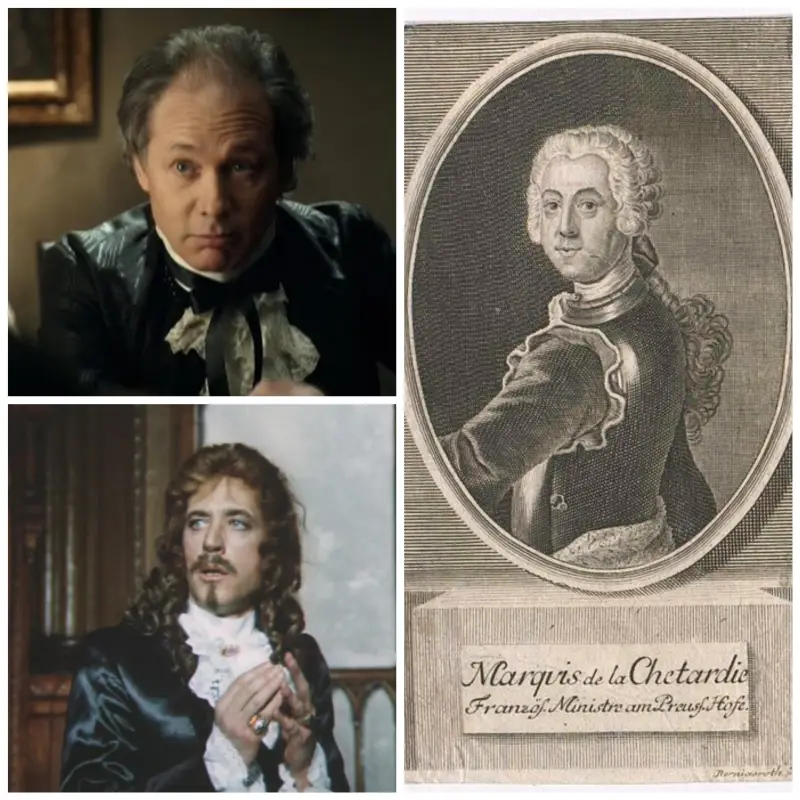
В previous article we talked about Chetardy's youth, his diplomatic career, his arrival in St. Petersburg and his participation in the conspiracy against the young Emperor John VI and his parents. This time we will continue the story about the fate of Chetardy and his attempts to influence history our country.
The Night Strike of Johann Lestocq
So, after a frank conversation between regent Anna Leopoldovna and Elizabeth on November 23, 1741, Lestocq realized that the conspiracy was practically exposed, and its participants were not arrested only because of the excessive kindness and gullibility of the emperor’s mother.
There was no time to coordinate actions with the allies (French Ambassador Chetardy and Swedish Envoy Nolken), he decided to act independently. On the night of November 25 (December 6), 1741, Elizabeth and Lestocq, at the head of 308 soldiers of the 1st company of the Preobrazhensky Regiment, set out to overthrow the young Emperor Anton Ioannovich.
These “brave boys” will go down in history as life-campans, and throughout the reign of Elizabeth, instead of serving, they will cause brawls with impunity in drinking establishments of the capital of the Russian Empire. Petersburg will be saved from their outrages by Peter III, who will order everyone to be sent to the villages given to them by the grateful Elizabeth.
But let's go back to November 1741.
At the age of 32, Elizabeth had already become so fat that she could not walk quickly, and therefore Lestocq ordered the soldiers to carry her on their shoulders.
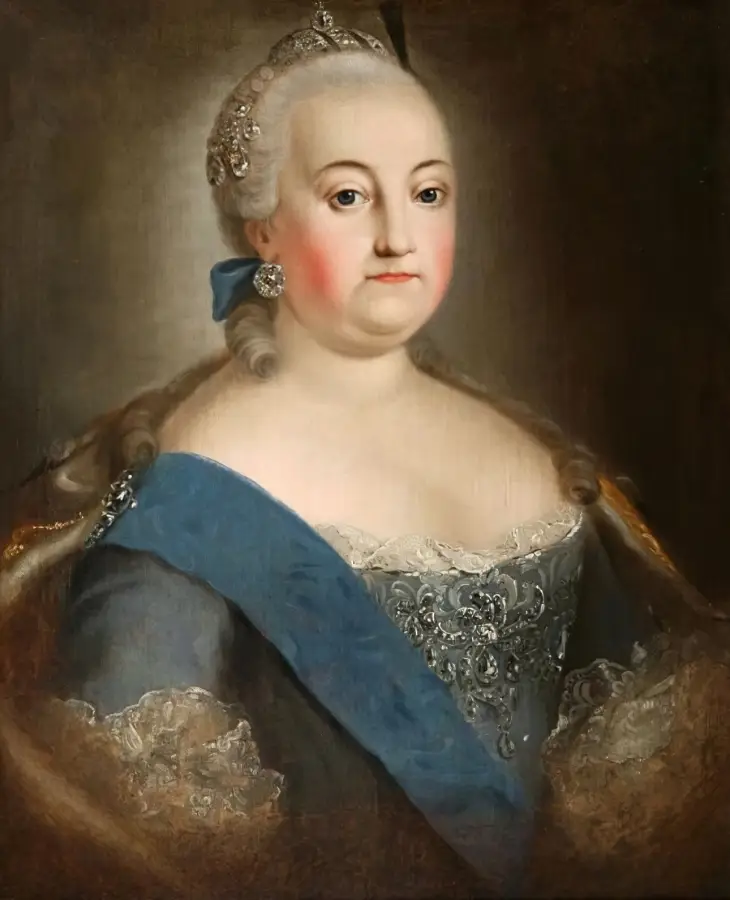
Elizabeth in a portrait by an unknown artist
It was Lestocq, by the way, who later pierced the sentry’s drum, preventing him from sounding the alarm. The conspirators burst into the bedroom and captured the emperor's sleeping parents, while 4-month-old Princess Catherine was thrown to the floor in the confusion: having hit her head, she lost her hearing and could hardly speak. Elizabeth, taking the baby emperor in her arms, said with expression:
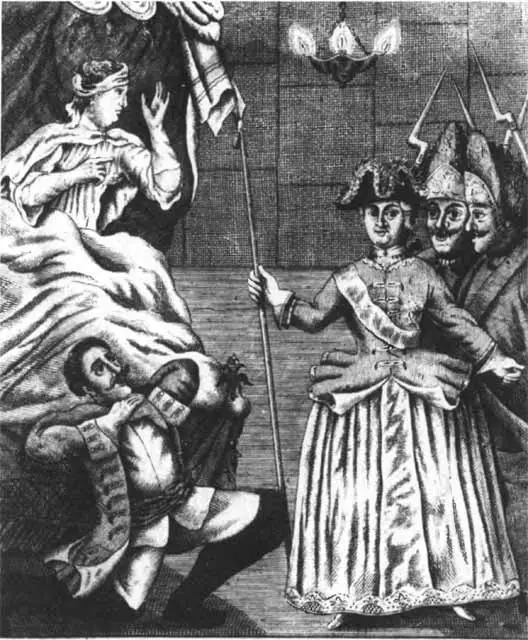
The arrest of the Brunswick family. German engraving from 1759
It is to this episode that the famous aphorism of the Saxon envoy Petzold refers:
Meanwhile, the victorious conspirators carried out arrests of people who could be dangerous to the new empress. Among them was, for example, the outstanding statesman Andrei Ivanovich Osterman, who is called the ideologist of Russia’s imperial policy after the death of Peter the Great. And the famous Field Marshal Minich, about whom Peter I said that no one understood his plans better than this Saxon.
Drunken soldiers confused the houses of Osterman and Shetardy, and greatly frightened the Frenchman, who decided that the conspiracy had been discovered and that they had “come” for him on the instructions of Anna Leopoldovna. The commander-in-chief of the victorious active Russian army, Peter Lassi, who then ended up in St. Petersburg, was almost arrested.
However, the field marshal, awakened by the drunken Preobrazhenists, when asked which party he belonged to, wisely answered: “To the currently reigning one.” Not knowing what to do in this case, the rebels left his house, and Lassi went to the troops. On August 26, 1742, he again defeated the Swedes, forcing them to capitulate at Helsingfors. After the end of the war, he returned to St. Petersburg on Elizabeth’s personal yacht.
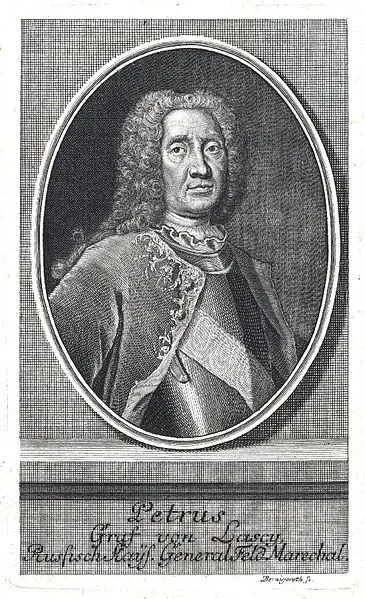
Martin Bernigeroth. Peter von Lacy, 1730
Triumph and rise of Chétardie
But what happened to Chetardie, who was almost arrested by mistake?
Although the coup was carried out by Lestocq without his participation, grateful Elizabeth awarded the marquis two orders at once - St. Andrew the First-Called and St. Anne, and brought him closer to her.
It must be said that he tried to save the defeated Sweden and achieved a truce. However, the Swedes themselves violated this truce a month later, which led to the complete defeat of their army by Lassi’s troops.
In September 1742, Chétardy was recalled to France for consultations - and upon departure he was again generously awarded by Elizabeth. The Marquis maintained connections with Lestocq, who wrote in letters that Elizabeth really wanted the French king to recognize her as the imperial title.
Return of Chétardie
Soon Elizabeth turned to Versailles with a request to return her friend to St. Petersburg. The Marquis did not object. On the way to the capital of Russia, he carried out two diplomatic assignments from the king - in Copenhagen and in Stockholm.
Chétardie's status was strange and uncertain. He seemed to be going to Russia as a private person, hoping to communicate directly with Elizabeth in a friendly manner - bypassing ministers and secretaries. But he had with him two important letters from Louis XV. In the first, the king, addressing Elizabeth, called her empress, but this title was not supported by his credentials.
The king's second letter was almost the much-coveted credentials, but was not backed by the chancellor's signature and therefore could not be considered an official document.
Chétardie himself had to decide which of these letters to give to Elizabeth. At the same time, he was supposed to hint that a “correctly executed” document from Versailles would arrive after the resignation of Chancellor A.P. Bestuzhev-Ryumin, who was hostile to France.
Ironically, it was Shetardy who in December 1741 recommended that Elizabeth introduce Bestuzhev to the Senate and appoint him to the post of vice-chancellor. Now he has become the main enemy of Shetardy and Lestocq.
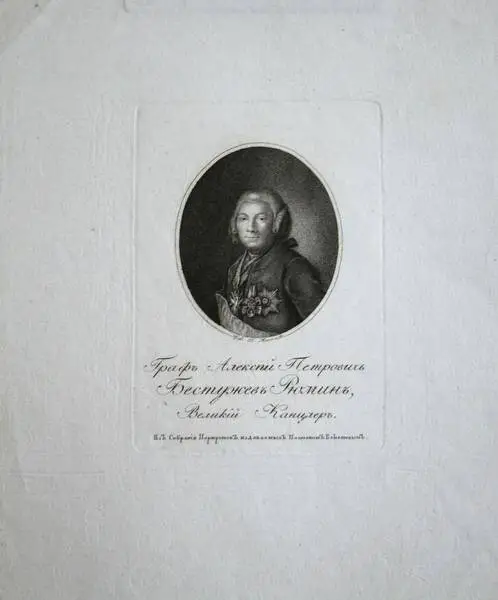
Enemies and allies
Shetardy returned to St. Petersburg at the end of November 1743. Although Elizabeth was extremely kind to the Marquis, calling him a “particular friend,” she immediately stated:
It turned out that the new empress is absolutely not involved in state affairs, but changes her dresses 4-5 times a day, and she is only interested in “amusements in the inner chambers with all sorts of vile rabble” (from Shetardie’s letter to Versailles).
Elizabeth entrusted all matters to Chancellor A.P. Bestuzhev-Ryumin, whom Shetardie came to “overthrow.” And he was, as they say, “bought outright” by the Austrians and the British, whose “pensions” significantly exceeded his official salary. Frederick II wrote about Bestuzhev:
In addition, Bestuzhev did not deny himself the regular consumption of alcoholic beverages. Later, the Prussian envoy Karl Wilhelm von Finckenstein (appointed to St. Petersburg in 1747) reported to Berlin:
Bestuzhev came up with the famous “Peter the Great system” and, despite the changing situation, he consistently followed it for 16 years. According to this “System”, Austria and two “maritime powers” – England and Holland – were “appointed” as Russia’s allies. But the diplomatic talents of the chancellor were such that Russia managed to enter the Seven Years' War on the side of the allied Austria and the enemy France against the “natural ally” - England and friendly Prussia.
In the Russian capital, Chetardie again met with Lestocq, who warmly received him, who had great influence on Elizabeth and was already a Privy Councilor, “the first physician and chief director of the Medical Chancellery and the entire Faculty of Medicine,” as well as a Count of the Holy Roman Empire. New “confidants” were also found: the Prussian envoy Axel von Mardefeld, and then Johanna of Zerbst, the mother of the bride of the heir to the throne (the future Catherine II).
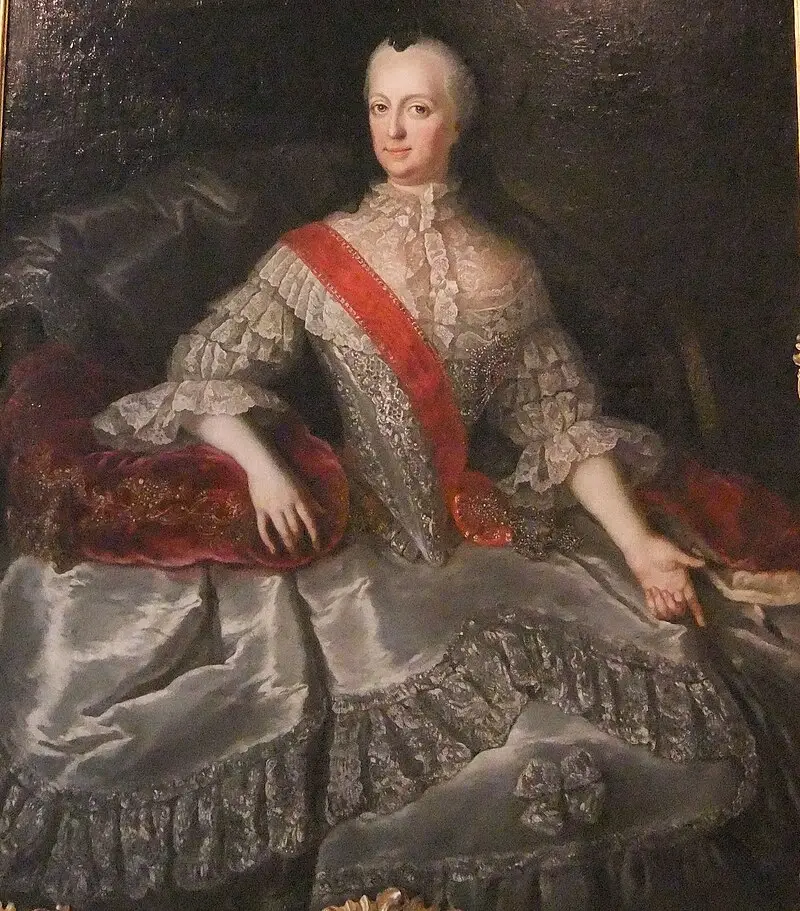
Johanna of Zerbst in the portrait of Anne Rosina de Gasc
But Chétardy developed a very tense relationship with the French ambassador D'Alyon, who was afraid that the Marquis, taking advantage of his previous connections with Elizabeth, would push him into the background. In the spring of 1744, it all ended in such a quarrel that Shetardy gave the ambassador a slap in the face (more like a blow, because they were talking about a black eye), and he pulled out a sword, which the Marquis had to pull back with his bare left hand, having been wounded.

This is how viewers of the film “Midshipmen, Forward” (1987) saw the French Ambassador D'Allon
D'Allon was recalled to Paris, while Chetardie was ordered to intensify his activities.
Meanwhile, in 1744, the search for a bride for the heir to the throne began. Chancellor Bestuzhev insisted on the candidacy of the Saxon princess Marianne, the daughter of Augustus III. Chétardy, Lestocq and Brumaire advocated for Sophia Augusta Frederica of Anhalt-Zerbst, whose father served Frederick II, and whose mother carried out some delicate assignments for the Prussian king. Friedrich's protégé won this competition due to two circumstances.
Firstly, she was “poor, like a church mouse” and therefore, as it seemed to Elizabeth, she should have been overjoyed and behaved quietly and meekly at court, given birth to her husband’s children and not got involved in politics.
On the other hand, her mother was the sister of Elizabeth’s fiancé, who really wanted this marriage. But the prince died on the eve of the wedding, and this was a terrible blow for Elizabeth. The empress's sentimental memories played a big role then.
With the 15-year-old German princess came her 33-year-old mother, Johanna, who, as we have already said, immediately became an ally of Chetardy and Lestocq.
Defeat of Chetardy and his allies
It seemed that clouds began to gather over Bestuzhev, but, not being a good politician
and a diplomat, he turned out to be simply an outstanding court intriguer. It was Bestuzhev who at one time created the famous “black office”, which was engaged in illustrating diplomatic letters. European diplomats, of course, were very prudent people and encrypted their letters.
However, Bestuzhev managed to find an excellent specialist who could “click” foreign ciphers like seeds. He became a Prussian mathematician of Jewish origin and Russian academician Christian Goldbach, a former teacher of Peter II. He, however, had his own principles, and he refused to decipher the correspondence of his “native” Prussian embassy. But the letters from Shetardy were enough.
Bestuzhev collected 69 sheets of incriminating evidence against the Marquis, Lestocq and Johanna, and in 1744, at the right moment, he slipped Elizabeth a folder with an intriguing inscription:
If these documents had dealt with serious political intrigue, Elizabeth would probably have read a few lines, put them aside and forgotten them in a couple of days. But Bestuzhev knew his empress well: the proposed passages contained unpleasant characteristics of Elizabeth herself. Chetardie wrote that she:
What's because of her
Stated:
He also called her lazy and promiscuous. Elizabeth's reaction was lightning fast and quite predictable. In June 1744, Shetardy received an order to go abroad within 24 hours - under the escort of six soldiers and an officer.
In Novgorod, a courier caught up with him and demanded the return of Elizabeth’s gift - a snuff box decorated with diamonds. D'Allon returned to St. Petersburg and brought with him the credentials so desired by Elizabeth, in which the King of France recognized her as the empress.
On September 28, 1745, Princess Johanna of Zerbst was expelled from Russia, who, however, received 50 thousand rubles from the empress as a farewell, as well as two chests of expensive fabrics and jewelry. Her daughter was left in Russia and nevertheless became the wife of the heir to the throne, and then, as we know, she organized a conspiracy that ended in the murder of her husband, Emperor Peter III.
Lestok lost his former influence on Elizabeth. He could not accept defeat and in 1747 tried to act against Bestuzhev in alliance with the Prussian ambassador Fink von Finckenstein. But the clever courtier Bestuzhev again intercepted his letters in 1748. On his orders, Lestocq was tortured, forcing him to confess to malicious intent on Elizabeth’s life.
These accusations were not confirmed, but the empress still sent him into exile - first to Uglich, and then to Veliky Ustyug. For 13 years, the man who actually elevated Elizabeth to the throne lived in poverty, barely making ends meet. He was returned to St. Petersburg by Peter III - after the death of this empress.
The last years of the life of the Marquis de Chétardie
Immediately upon his arrival in France, Chetardie was arrested and placed in the prison of the Montpellier fortress: we remember that Paris aime les vainqueurs (“Paris loves winners”). And he really doesn't like losers. However, no major sins were found against Shetardie. He was released and sent to fight in Italy.
In 1749 he returned to diplomatic activity - he became the French envoy to the Turin court. During the Seven Years' War he again found himself in the army, took part in the battle of Rosbach, and served as commandant of the city of Hanau. He rose to the rank of lieutenant general and died in the German (Hesse-Kassel) city of Hanau in 1759 - at the age of 51.
Information